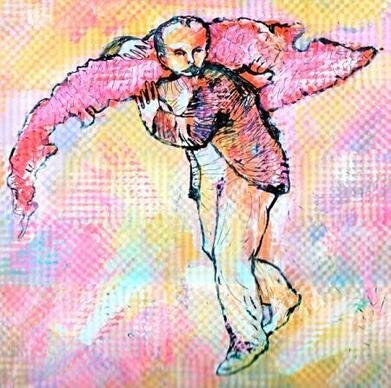|
Millions have proudly bared their shoulders to receive the Cuban vaccine "Abdala," but few know that this was the name given by Cuba’s national hero, José Martí, in his dramatic poem of the same name, to a young black African who fought and died for the independence of his country Photo: Artwork by Kamil Bullaudy Millions have proudly bared their shoulders to receive the Cuban vaccine "Abdala," but few know that this was the name given by Cuba’s national hero, José Martí, in his dramatic poem of the same name, to a young black African who fought and died for the independence of his country, Nubia, invaded by colonialists. Abdala is the first play written by Martí when he had not yet reached 16 years of age. It is a testament to the love for his homeland of a young man from Nubia, a Sudanese region south of Egypt, a poem published in the context of the beginning of Cuba’s first war against Spain. In its eight scenes, the young Martí outlines his patriotic ideals and offers a preview of his own life. In the initial part of the drama, a senator comments to Abdala that a conqueror is threatening to occupy Nubian territory, and upon hearing the news the young man responds firmly: “Well, tell the tyrant that in Nubia / There is one hero for each of his twenty spears... “ The third act of the play features Abdala's meeting with warriors going out to confront the aggressors, when he says: “To war, brave men! From the tyrant / Let the blood flow, and to his impudent enterprise / Let our stout breasts serve as walls, / And let their blood fire our audacity!” The fourth and fifth scenes are very moving, as they reflect his mother's fear for her son, as she attempts to dissuade him from going to war, but Abdala tells her that he cannot be detained and is going to the countryside to defend his homeland. In this part of the play, Martí conveys in Abdala's voice his concept of homeland, which is well known and clearly evident in his life’s work: “Love, mother, for the Homeland / Is not ridiculous love for the land, / Nor for the grass where our plants tread; / It is invincible hatred for those who oppress it, / Eternal wrath for those who attack it…” Anticipating what would be his own death in combat, Martí concludes his dramatic poem as Abdala lies dying but happy, content that the enemy had been defeated. Like the young Abdala, created in his work when he was only an adolescent, Martí dedicated his life to his people’s cause and was present where the battles were fought, facing the death he had foreseen. Cuba’s national hero lived his life according to the precept he raised in New York City’s Hardman Hall, on October 10, 1890, when he insisted: "The true man does not look toward the side where one lives better, but toward the side where duty lies; this is the true man." And this is Abdala, in the vaccine we carry inside, with the same patriotic pride with which Martí conceived the young African hero. AuthorThis article was produced by Granma. Archives January 2022
0 Comments
Leave a Reply. |
Details
Archives
July 2024
Categories
All
|

 RSS Feed
RSS Feed